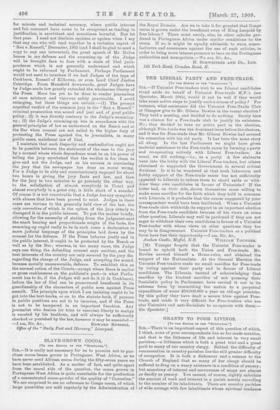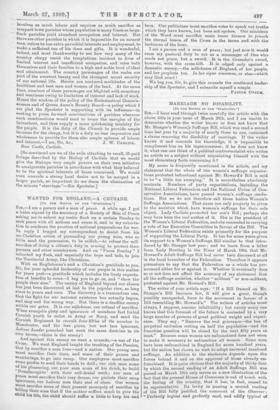GRANTS TO POOR LIVINGS.
[TO Till EOITOR OF Till “SPROTATOR.1
SIR,—There is an important aspect of this question of which, I think, none of your correspondents has so far made mention, and that is the littleness of life and interest in very small parishes,—a littleness which is both a great trial and a great peril to many of our country clergy. Behind the difficulty of remuneration in country parishes lies the still greater difficulty of occupation. It is both a dishonour and a menace to the Church of England that so many of her clergy should be suffered to drag on a weary existence in a condition of penury; but monotony of interest and narrowness of scope are almost as deadly as penury. You cannot, of course, rightly calculate the amount of work and interest in a parish merely according to the number of its inhabitants. There are country parishes of wide acreage with few inhabitants whose spiritual tendanoe
Involves as much labour and requires as much sacrifice as compact town parishes whose population is many times as large. Such parishes yield abundant occupation and interest. But there are other parishes in which it is impossible for an earnest man, unless he has extra-parochial interests and employment, to make a sufficient use of his time and gifts. It is wonderful, indeed, and most thankworthy to see how very many of the country clergy resist the temptations incident to lives of 'united interest and ineufficient occupation, and raise both themselves and their families.to a high and noble level of ideal and attainment. The country parsonages of the realm are part of the sweetest beauty and the strongest moral security of our national life. Herein are nurtured multitudes of the healthiest and best men and women of the land. At the same time, numbers of these parsonages are blighted with monotony and weariness owing to limitation of interest and lack of work. Hence the wisdom of the policy of the Ecclesiastical Commis- sioners and of Queen Anne's Bounty Board—a policy which I am glad the Spectator is supporting with its influence—in seeking to press forward combinations of parishes wherever such combinations would tend to brace the energies of the incumbent, and thus supply a more quickening ministry for the people. It is the duty of the Church to provide ample incomes for the clergy, but it is a duty no less imperative and wholesome to provide for them also ample spheres of labour [So convinced are we of the evils attaching to small, ill-paid livings described by the Bishop of Carlisle that we would give the Bishops very ample powers on their own initiative to amalgamate parishes in accordance with what they believed to be the spiritual interests of those concerned. We would even override a strong local desire not to be merged in a larger parish,, so important do we deem the elimination of the minute " starvings."—En. Spectator.]











































 Previous page
Previous page